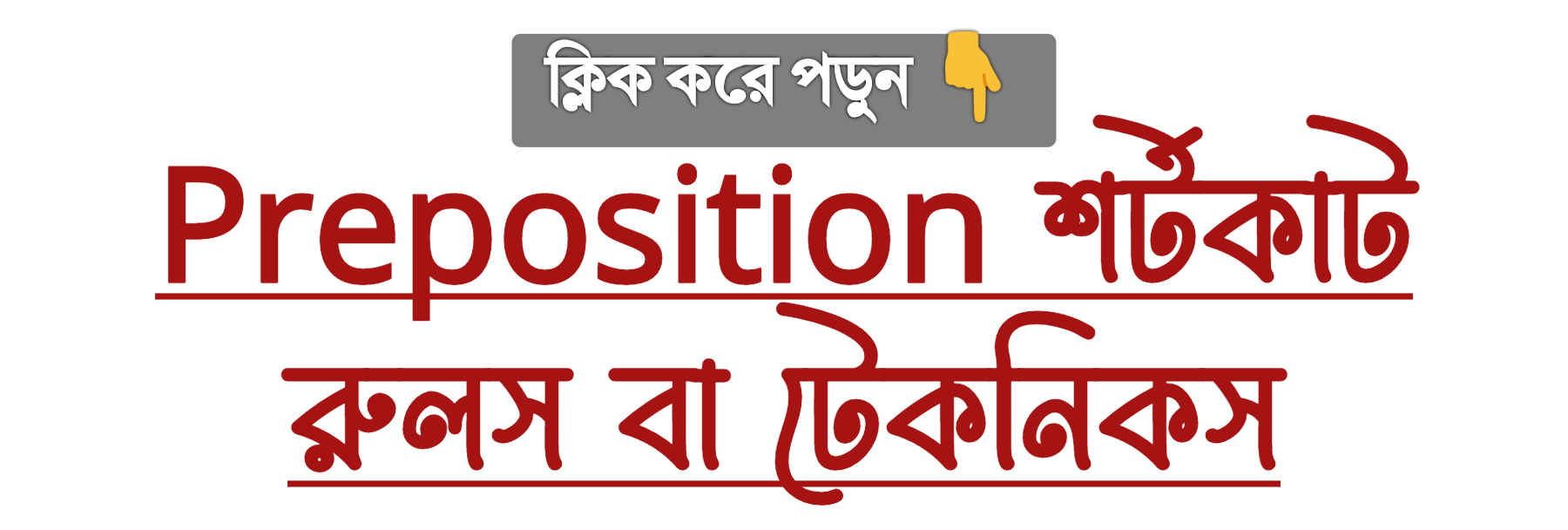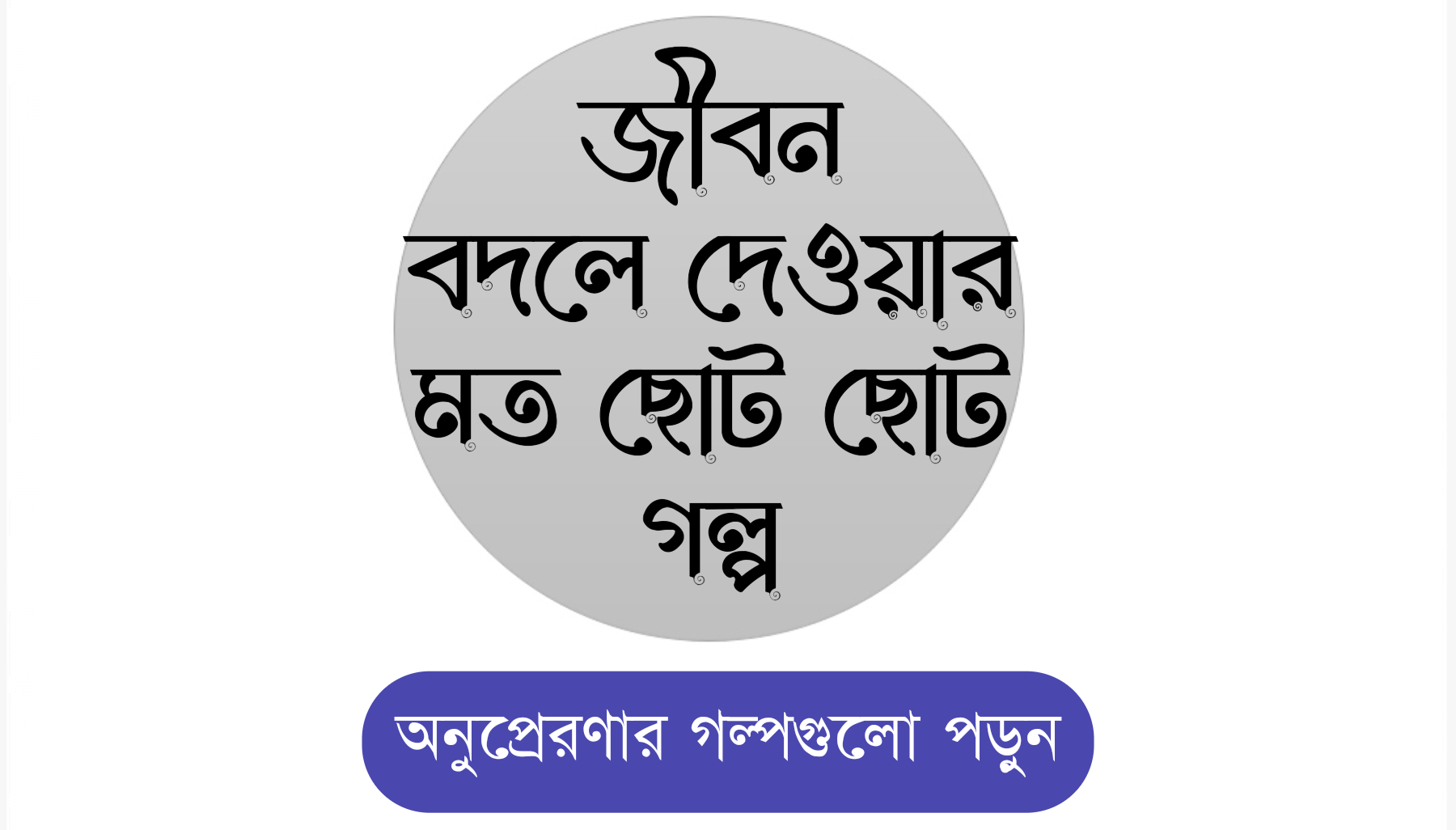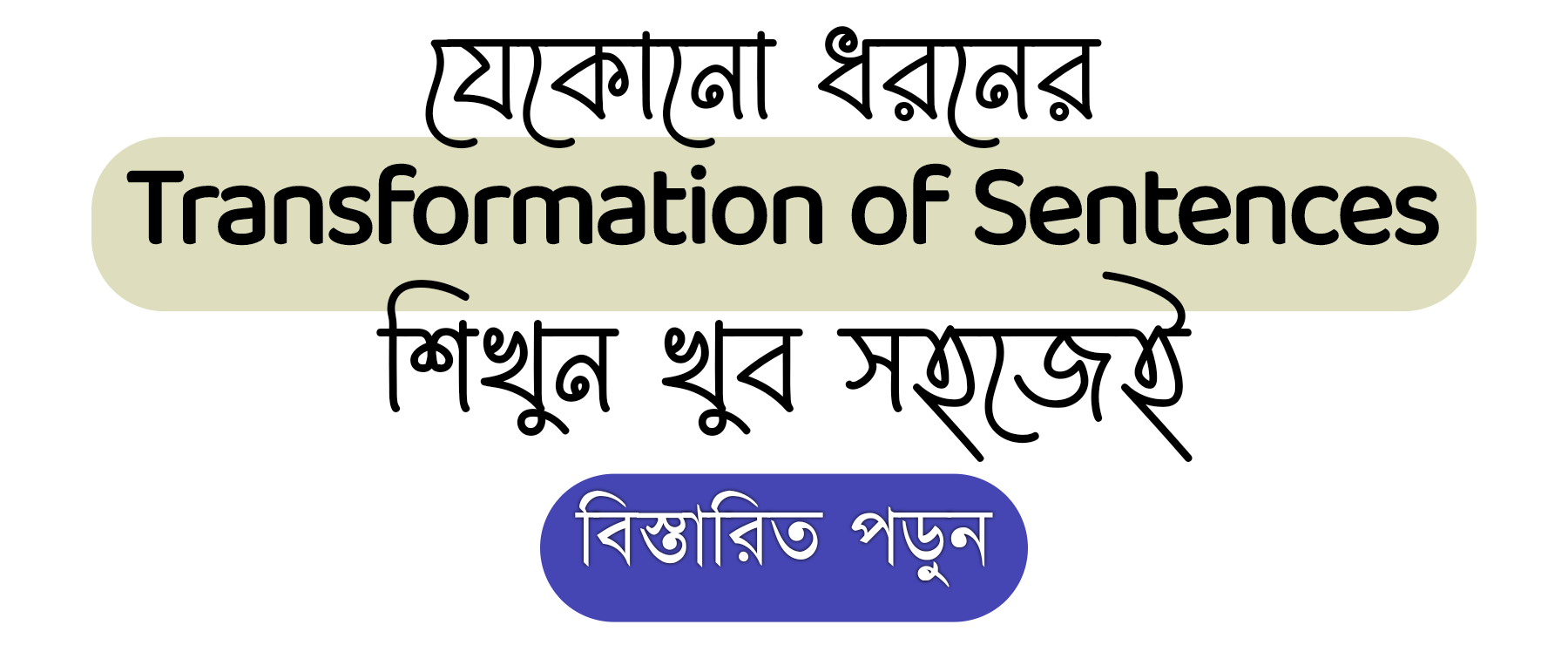বিসিএস প্রিলি
#GERUND & #PERTICIPLE : ing যুক্ত কোন word যদি
I ) verb + noun এর কাজ করে তাহলে gerund হবে । এবং
ii ) verb + adjective এর কাজ করে তাহলে participle হবে ।
GERUND:
# বাক্য যদি চলমান না বুঝায় তাহলে হবে gerund .
# Example : walking is good for health .
( verb + noun ) Explain : is হল verb । আর verb এর আগে সাধারণত noun / pronoun বসে । অর্থঃ হাটা স্বাস্থের জন্য ভাল । ব্যাখ্যাঃ এই বুঝাচ্ছে না যে এখন কেউ হাটছে । তাই gerund হবে ।
# Example : I like swimming অর্থঃ আমি সাতার পছন্দ করি । চলমান না তাই gerund
# Example : This is my reading room . অর্থঃ এই হল আমার পড়ার কক্ষ । ব্যাখ্যাঃ চলমান বুঝাচ্ছে না , তাই gerund
# Example : A walking street . অর্থঃ একটি হাটার রাস্তা । ব্যাখ্যাঃ চলমান নয় তাই gerund.
PARTICIPLE
# ing যুক্ত word এর বাক্যের অর্থ দ্বারা যদি চলমান কিছু বুঝায় তাহলে হবে participle
Example : I saw a walking boy . ( verb + adj )
explain : boy noun . আর noun কে adjective modified করে । অর্থঃ আমি একটি বালক হাটতে দেখেছি । ব্যাখ্যাঃ অর্থ চলমান বুঝাচ্ছে তাই participle হবে ।
# Example : It is breaking news . ব্যাখ্যা : চলমান বুঝাচ্ছে তাই participle.
# Example : A rolling stone gathers no moss . অর্থঃ ঘূর্ণায়মান পাথরে শেওলা জন্মে না । ব্যাখ্যা পাথরটি ঘুরছে । মানে চলমান তাই participle.
CLAUSE ::::::
Noun clause : এই clause - এ Underline এর বরাবর it বসিয়ে যদি বাক্যটি পূর্ণ হয় তবে বুঝবেন এটি অবশ্যই Noun clause. শুধু it বসিয়ে বাক্য পূর্ণ হলেই Noun Clause.যেমন
( ১ ) ( That he is a criminal ) is known to all
( ২ ) We don ' t know ( what he is talking about . ) এখানে ( ১ ) ও ( ২ ) নং এ ব্রাকেট এর পরিবর্তে It বসালে বাক্য পূর্ণ হবে অর্থাৎ Noun Clausel যেমন - ( 1 ) It is known to all . ( 2 ) We don ' t know it .
Adjective clause: Underlined অংশটি হাতের আঙ্গুল দিয়ে ঢেকে দিয়ে যদি বাক্য পূর্ণ তখন বুঝবেন অবশ্যই Adjective clause
যেমন - ( ১ ) The boy ( who doesn ' t know to manner ) is my brother . এখানে Underline অংশটি একপাশে রেখে দিলে হয় = The boy is my brother । বিশ্বাস নাহলে বই খুলে নিজে দেখুন ।
Adverb Clause : এটি চেনা অত্যন্ত সােজা । কারণ তিনটি অপশন থেকে It দিয়ে বা আঙ্গুলে চেপে ধরলেও | Noun clause , Adjective clause কোনটিই না হলে ধরে নিবেন ১০০ % Clause টি Adverbial.
Verb Shortcut Techniques:
1 ) Tense চেনা গেলে = Finite Verb . 2 ) Tense চেনা না গেলে = Non - finite Verb .
The Past Continuous: অতীতের দুটি । সমসাময়িক কাজ when / while দ্বারা যুক্ত হলে when / while যুক্ত অংশটি Past Continuous হয় , অপরটি হয় Past Indefinite . উল্লেখ্য, while এর পর subject থাকলে এ নিয়ম প্রযােজ্য ।.....My uncle arrived while I was watching Tv. ( কিন্তু while এর পর subject না এসে সরাসরি verb এলে এর সাথে ing যুক্ত হবে । যেমন - While walking in the garden , he broke his leg.
#Principal Clause এর Verb যদি Past Tense হয় তাহলে Subordinate clause - এর Verb Narration এর নিয়ম অনুযায়ী সাধারণত Corresponding past Tense হয় ।
অর্থাৎ Present Indefinite থাকলে Past Indefinite হয় ।
Present Continous থাকলে Past Continuous হয়
Present Perfect থাকলে Past Perfect হয়
#Past Indefinite থাকলে Past Perfect হয় Will থাকলে Would হয় । যেমন — They asked me what I (have taken) for breakfast. ব্যাখ্যা : আলােচ্য বাক্যে Principal Clause এ Past Tense আছে তাই Subordinate Clause - এ Present Perfect এর ব্যবহার ভুল হয়েছে । এখানে Past Perfect ব্যবহার করতে হবে । অর্থাৎ বাক্যটি হবে এরূপ They asked me what I had taken for breakfast .
#While এর ঠিক পরে Subject থাকলে অতীতের ক্ষেত্রে Past Continuous Tense হয় । কিন্তু While এর ঠিক পরে Subject না থেকে যদি সরাসরি Verb থাকে তাহলে উক্ত Verb - এর সাথে - ing যুক্ত হয় ।
#অতীতের দুটি ক্রমিক ঘটনার ক্ষেত্রে before এর পূর্বে এবং after এর পরে Past Perfect Tense হয় , অন্যটি হয় Past Indefinite . > I reached the station after the train (to leave)... had left
#বাক্যে by this time , by ( time , month , year ) , next ( time , month , year ) by next ( time , month , year ) ইত্যাদি থাকলে Future Perfect Tense হয় । যেমন : Next August , Lata and Tanim will have been married for 10 years
#It is time , it is high time ইত্যাদির পর Subject থাকলে Verb - টি Past Tense এর হয় । আর এদের পর subject না থাকলে to + Verb হয় । যেমন It is high time we discussed the matter, It is time ( do ) the work to do
#it was time, it was high time ইত্যাদির পর Subject থাকলে Verb - টি Past Perfect Tense এর হয়
#বাক্যে as if , as though , wish এর পর to be verb আসলে তা সব সময় were হবে । অন্য কোনাে Verb আসলে তার Past tense হয় । যেমনঃ Rishan walks as if he were a lame .
#Since দ্বারা দুটি বাক্যাংশ যুক্ত হলে since এর পূর্বে Present Indefinite/Present Perfect হলে since এর পর Past Indefinite Tense হয়
#since এর আগে Past indefinite থাকলে এর পরে Past Perfect হয় যেমনঃ Some days have passed since my father died.
#বাক্যে mind , cannot help . could not help , with a view to , look forward to . be used to, get used to , worth ইত্যাদির পর কোনাে Verb আসলে উক্ত Verb - এর সাথে ing যুক্ত হয় । যেমনঃ She is looking forward to going Europe. Would you mind closing the door .
#Preposition এরপর কোনাে Verb আসলে উক্ত Verb এর সাথে ing যুক্ত হয়।
#Lest দ্বারা দুটি বাক্যাংশ যুক্ত হলে Lest যুক্ত অংশের Subject এর পর should হয় এবং মূল Verb এর Present form বসে ।
যেমনঃ He ran fast lest he should miss the train.
#No sooner had - than , scarcely had – when , hardly had – before এর প্রথম অংশ Past Perfect হেতু Verb এর Past Participle হয় এবং ২য় অংশে । Past Indefinite হয় ।
উল্লেখ্য , no sooner.......than, scarcely......when , hardly........ when আসে - এ বিষয়টি মাথায় রাখতে হবে ।
যেমনঃ No sooner had we reached the station than the train left, Hardly had the train stopped before we got down, Scarcely had we started when it began to rain,
#have , has , having , to be এর পর ব্রাকেটের Verb এর Past Participle হয় । যেমন > Hasan has choosen the right path.
//
কালেক্টেড

















